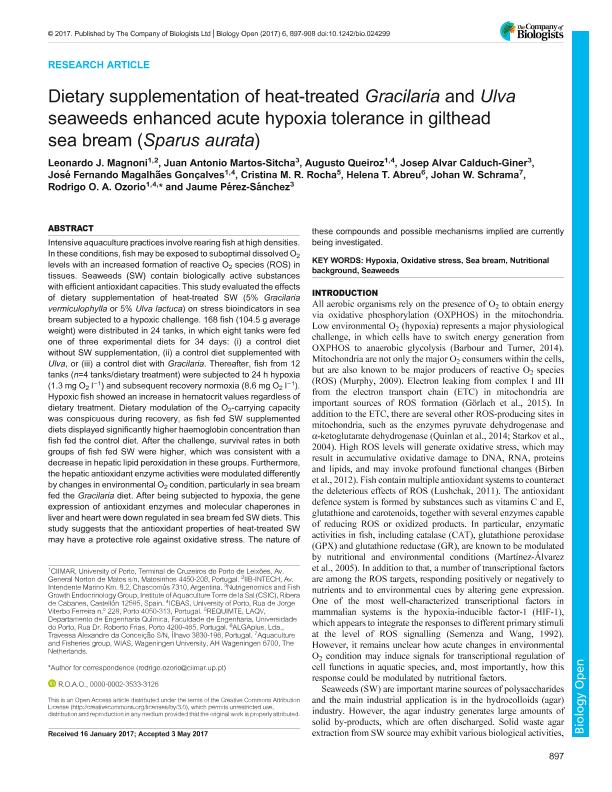Mostrar el registro sencillo del ítem
dc.contributor.author
Magnoni, Leonardo Julián

dc.contributor.author
Martos Sitcha, Juan Antonio
dc.contributor.author
Queiroz, Augusto
dc.contributor.author
Calduch Giner, Josep Alvar
dc.contributor.author
Magalhaes Gonçalves, Jose Fernando
dc.contributor.author
Rocha, Cristina M.R.
dc.contributor.author
Abreu, Helena T.
dc.contributor.author
Schrama, Johan W.
dc.contributor.author
Ozorio, Rodrigo O.A.
dc.contributor.author
Perez Sanchez, Jaume
dc.date.available
2018-06-24T17:13:59Z
dc.date.issued
2017-06
dc.identifier.citation
Magnoni, Leonardo Julián; Martos Sitcha, Juan Antonio; Queiroz, Augusto; Calduch Giner, Josep Alvar; Magalhaes Gonçalves, Jose Fernando; et al.; Dietary supplementation of heat-treated Gracilaria and Ulva seaweeds enhanced acute hypoxia tolerance in gilthead sea bream (Sparus aurata); Company of Biologists Ltd; Biology Open; 6; 6; 6-2017; 897-908
dc.identifier.issn
2046-6390
dc.identifier.uri
http://hdl.handle.net/11336/49890
dc.description.abstract
Intensive aquaculture practices involve rearing fish at high densities. In these conditions, fish may be exposed to suboptimal dissolved O2 levels with an increased formation of reactive O2 species (ROS) in tissues. Seaweeds (SW) contain biologically active substances with efficient antioxidant capacities. This study evaluated the effects of dietary supplementation of heat-treated SW (5% Gracilaria vermiculophylla or 5% Ulva lactuca) on stress bioindicators in sea bream subjected to a hypoxic challenge. 168 fish (104.5 g average weight) were distributed in 24 tanks, in which eight tanks were fed one of three experimental diets for 34 days: (i) a control diet without SW supplementation, (ii) a control diet supplemented with Ulva, or (iii) a control diet with Gracilaria. Thereafter, fish from 12 tanks (n=4 tanks/dietary treatment) were subjected to 24 h hypoxia (1.3 mg O2 l-1) and subsequent recovery normoxia (8.6 mg O2 l-1). Hypoxic fish showed an increase in hematocrit values regardless of dietary treatment. Dietary modulation of the O2-carrying capacity was conspicuous during recovery, as fish fed SW supplemented diets displayed significantly higher haemoglobin concentration than fish fed the control diet. After the challenge, survival rates in both groups of fish fed SW were higher, which was consistent with a decrease in hepatic lipid peroxidation in these groups. Furthermore, the hepatic antioxidant enzyme activities were modulated differently by changes in environmental O2 condition, particularly in sea bream fed the Gracilaria diet. After being subjected to hypoxia, the gene expression of antioxidant enzymes and molecular chaperones in liver and heart were down regulated in sea bream fed SW diets. This study suggests that the antioxidant properties of heat-treated SW may have a protective role against oxidative stress. The nature of these compounds and possible mechanisms implied are currently being investigated.
dc.format
application/pdf
dc.language.iso
eng
dc.publisher
Company of Biologists Ltd
dc.rights
info:eu-repo/semantics/openAccess
dc.rights.uri
https://creativecommons.org/licenses/by-nc-sa/2.5/ar/
dc.subject
Hypoxia
dc.subject
Nutritional Background
dc.subject
Oxidative Stress
dc.subject
Sea Bream
dc.subject
Seaweeds
dc.subject.classification
Otras Ciencias Biológicas

dc.subject.classification
Ciencias Biológicas

dc.subject.classification
CIENCIAS NATURALES Y EXACTAS

dc.subject.classification
Agricultura

dc.subject.classification
Agricultura, Silvicultura y Pesca

dc.subject.classification
CIENCIAS AGRÍCOLAS

dc.subject.classification
Otras Ciencias Veterinarias

dc.subject.classification
Ciencias Veterinarias

dc.subject.classification
CIENCIAS AGRÍCOLAS

dc.title
Dietary supplementation of heat-treated Gracilaria and Ulva seaweeds enhanced acute hypoxia tolerance in gilthead sea bream (Sparus aurata)
dc.type
info:eu-repo/semantics/article
dc.type
info:ar-repo/semantics/artículo
dc.type
info:eu-repo/semantics/publishedVersion
dc.date.updated
2018-06-21T14:20:19Z
dc.journal.volume
6
dc.journal.number
6
dc.journal.pagination
897-908
dc.journal.pais
Reino Unido

dc.journal.ciudad
Cambridge
dc.description.fil
Fil: Magnoni, Leonardo Julián. Consejo Nacional de Investigaciones Científicas y Técnicas. Centro Científico Tecnológico Conicet - La Plata. Instituto de Investigaciones Biotecnológicas. Instituto de Investigaciones Biotecnológicas "Dr. Raúl Alfonsín" (sede Chascomús). Universidad Nacional de San Martín. Instituto de Investigaciones Biotecnológicas. Instituto de Investigaciones Biotecnológicas "Dr. Raúl Alfonsín" (sede Chascomús); Argentina. Universidad de Porto; Portugal
dc.description.fil
Fil: Martos Sitcha, Juan Antonio. Consejo Superior de Investigaciones Científicas; España
dc.description.fil
Fil: Queiroz, Augusto. Universidad de Porto; Portugal
dc.description.fil
Fil: Calduch Giner, Josep Alvar. Consejo Superior de Investigaciones Científicas; España
dc.description.fil
Fil: Magalhaes Gonçalves, Jose Fernando. Universidad de Porto; Portugal
dc.description.fil
Fil: Rocha, Cristina M.R.. Universidad de Porto; Portugal
dc.description.fil
Fil: Abreu, Helena T.. ALGAplus; Portugal
dc.description.fil
Fil: Schrama, Johan W.. Wageningen University; Países Bajos
dc.description.fil
Fil: Ozorio, Rodrigo O.A.. Universidad de Porto; Portugal
dc.description.fil
Fil: Perez Sanchez, Jaume. Consejo Superior de Investigaciones Científicas; España
dc.journal.title
Biology Open
dc.relation.alternativeid
info:eu-repo/semantics/altIdentifier/doi/https://dx.doi.org/10.1242/bio.024299
dc.relation.alternativeid
info:eu-repo/semantics/altIdentifier/url/http://bio.biologists.org/content/6/6/897
Archivos asociados
